一般将来时
一般将来时用法总结
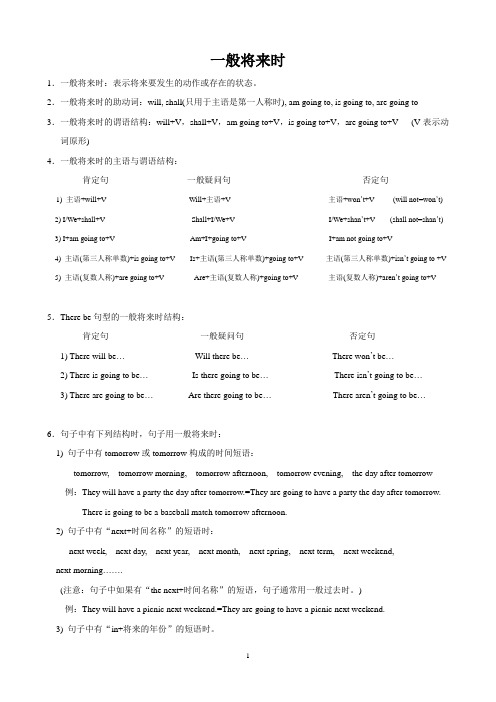
一般将来时1.一般将来时:表示将来要发生的动作或存在的状态。
2.一般将来时的助动词:will, shall(只用于主语是第一人称时), am going to, is going to, are going to3.一般将来时的谓语结构:will+V,shall+V,am going to+V,is going to+V,are going to+V (V表示动词原形)4.一般将来时的主语与谓语结构:肯定句一般疑问句否定句1) 主语+will+V Will+主语+V 主语+won’t+V (will not=won’t)2) I/We+shall+V Shall+I/We+V I/We+shan’t+V (shall not=shan’t)3) I+am going to+V Am+I+going to+V I+am not going to+V4) 主语(第三人称单数)+is going to+V Is+主语(第三人称单数)+going to+V 主语(第三人称单数)+isn’t going to +V5) 主语(复数人称)+are going to+V Are+主语(复数人称)+going to+V 主语(复数人称)+aren’t going to+V5.There be句型的一般将来时结构:肯定句一般疑问句否定句1) There will be…Will there be…There won’t be…2) There is going to be…Is there going to be…There isn’t going to be…3) There are going to be…Are there going to be…There aren’t going to be…6.句子中有下列结构时,句子用一般将来时:1) 句子中有tomorrow或tomorrow构成的时间短语:tomorrow, tomorrow morning, tomorrow afternoon, tomorrow evening, the day after tomorrow 例:They will have a party the day after tomorrow.=They are going to have a party the day after tomorrow.There is going to be a baseball match tomorrow afternoon.2) 句子中有“next+时间名称”的短语时:next week, next day, next year, next month, next spring, next term, next weekend,next morning…….(注意:句子中如果有“the next+时间名称”的短语,句子通常用一般过去时。
一般将来时
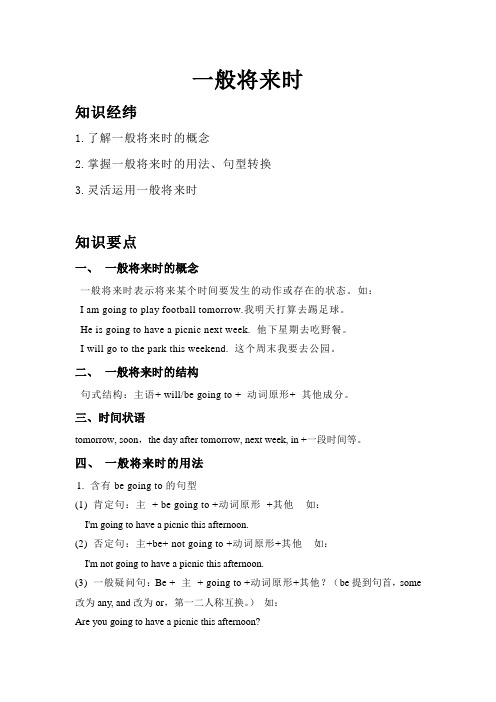
一般将来时知识经纬1.了解一般将来时的概念2.掌握一般将来时的用法、句型转换3.灵活运用一般将来时知识要点一、一般将来时的概念一般将来时表示将来某个时间要发生的动作或存在的状态。
如:I am going to play football tomorrow.我明天打算去踢足球。
He is going to have a picnic next week. 他下星期去吃野餐。
I will go to the park this weekend. 这个周末我要去公园。
二、一般将来时的结构句式结构:主语+ will/be going to + 动词原形+ 其他成分。
三、时间状语tomorrow, soon,the day after tomorrow, next week, in +一段时间等。
四、一般将来时的用法1. 含有be going to的句型(1) 肯定句:主+ be going to +动词原形+其他如:I'm going to have a picnic this afternoon.(2) 否定句:主+be+ not going to +动词原形+其他如:I'm not going to have a picnic this afternoon.(3) 一般疑问句:Be + 主+ going to +动词原形+其他?(be提到句首,some 改为any, and改为or,第一二人称互换。
)如:Are you going to have a picnic this afternoon?肯定回答:Yes, I am.否定回答:No, I’m not.2. 含有will的句型(will可用于所有人称,shall只用于第一人称I和we)( 1 ) 肯定句:主+ will +动词原形+其他如:I will play football tomorrow.(2) 否定句:主+ won’t +动词原形+其他(will后加not成won't)如:I won’t play football tomorrow.(3) 一般疑问句:Will + 主+ +动词原形+其他?(will提到句首,some改为any, and改为or,第一二人称互换) 如:Will you play football tomorrow?肯定回答:Yes, I will.否定回答:No, I won’t.五、一般将来时的特殊疑问句一般情况下,一般将来时的对划线部分有三种情况。
一般将来时态

this evening
What is the mouse going to do this evening? It is going to do its homework.
will
What is she going to do? She’s going to shop/ go shopping...
They are going to dance.
will
What are they going to do this evening? They are going to watch TV.
will
句式的变化规则:
1.变否定句—---在be/will后加not 。 2.变一般疑问句------将be/will动词提前。 (主语是第一人称I 时,变一般疑问句 时将I 变you) 3.特殊疑问句(也就是对划线部分提问) -----要用特殊疑问词what +一般疑问句。
表示“不肯”、“不能”等: e.g. We asked her to be the director but she won’t agree. Oil and water won’t mix. The car won’t start.
可表示未来情况的还有:
be going to 结构 现在进行时 一般现在时 be about to 结构 be + 不定式结构
系动词am,is,are的原形都是 。 例如: 系动词 , , 的原形都是be。 例如: 的原形都是 People will have robots in their home. 人们的家中将会有机器人。 人们的家中将会有机器人。 There will be one country in the world. 世界上将会只有一个国家。 世界上将会只有一个国家。 shall适用于第一人称 ,We;而will适用于所有人称。 适用于第一人称I, ; 适用于所有人称。 适用于第一人称 适用于所有人称 通常可以用will来代替 来代替shall。 通常可以用 来代替 。 will,shall均可缩写为:'ll,如: 均可缩写为: , , 均可缩写为 I will= I'll; ; she will = she’ll;will not 和shall not分别可以 ; 分别可以 缩写为 won't 和shan't。 。
一般将来时

由于will后接动词原形, 因此在 “there be”句型一般将来时的句中 will之后用be动词的原形, 即“be”一词, 无论后面是单、复数或不可数名 词(短语)。 e.g. There won’t be any paper money.
There will only be one country.
( ) 14. If it ________ tomorrow, we’ll go rollerskating.真实条件句用于陈述语气,表示存在的情况可能发生。其 中t if 是如果的意思。 A. isn’ rain B. won’t rain 在 if引导的是条件从句,用一般现在时, 主句用将来时。 C. doesn ’t rain D. doesn’t fine 主句中一般用shall/will 表示将来,而不用be going to 表
练习题
( ) 1. There __________ a meeting tomorrow afternoon.
A. will be going to C. is going to be
B. will going to be D. will go to be
( ) 2. Charlie ________ here next month. A. isn’t working B. doesn’t working
( ) 6. Mother ________ me a nice present on my next birthday. A. will gives B. will give C. gives D.l I buy a cup of tea for you? –________. (不,不要。) A. No, you won’t. B. No, you aren’t. C. No, please don’t. D. No, please.
一般将来时
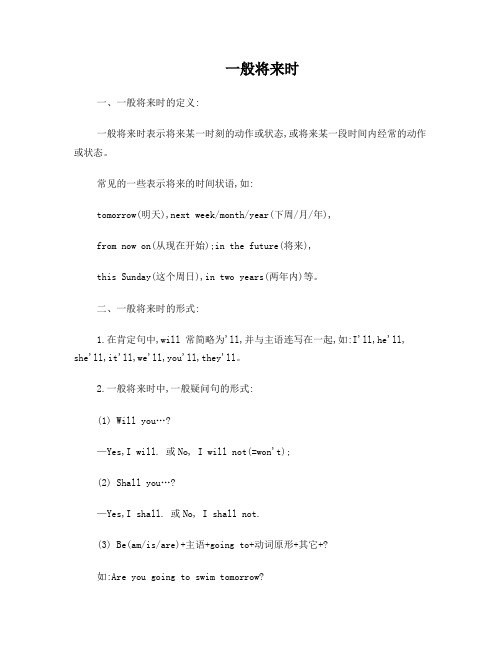
一般将来时一、一般将来时的定义:一般将来时表示将来某一时刻的动作或状态,或将来某一段时间内经常的动作或状态。
常见的一些表示将来的时间状语,如:tomorrow(明天),next week/month/year(下周/月/年),from now on(从现在开始);in the future(将来),this Sunday(这个周日),in two years(两年内)等。
二、一般将来时的形式:1.在肯定句中,will 常简略为'll,并与主语连写在一起,如:I'll,he'll, she'll,it'll,we'll,you'll,they'll。
2.一般将来时中,一般疑问句的形式:(1) Will you…?—Yes,I will. 或No, I will not(=won't);(2) Shall you…?—Yes,I shall. 或No, I shall not.(3) Be(am/is/are)+主语+going to+动词原形+其它+?如:Are you going to swim tomorrow?—Yes, I am./ No, I'm not.Is he/she going to play football next weekend?—Yes, he/she is./ No, he/she isn't.Are they going to go shopping this Sunday?—yes, they are./ No, they aren't.三、一般将来时的用法:1.一般将来时由“助动词shall(用于第一人称),或者will(用于第一、二、三人称)+动词原形”构成。
这种将来意义常常夹杂着情态意义即带有说话人的主观态度和看法,比如表示“预见”。
有时也含有“意愿”或“意图”的意思。
一般将来时
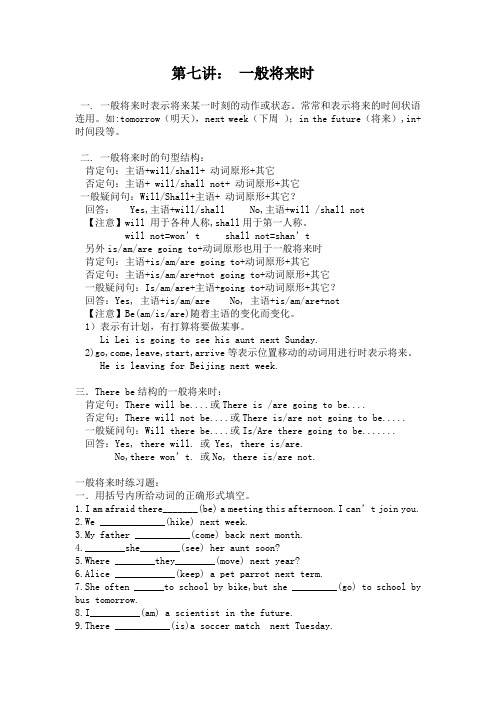
第七讲:一般将来时一. 一般将来时表示将来某一时刻的动作或状态。
常常和表示将来的时间状语连用。
如:tomorrow(明天),next week(下周);in the future(将来),in+时间段等。
二. 一般将来时的句型结构:肯定句:主语+will/shall+ 动词原形+其它否定句:主语+ will/shall not+ 动词原形+其它一般疑问句:Will/Shall+主语+ 动词原形+其它?回答: Yes,主语+will/shall No,主语+will /shall not【注意】will 用于各种人称,shall用于第一人称。
will not=won’t shall not=shan’t另外is/am/are going to+动词原形也用于一般将来时肯定句:主语+is/am/are going to+动词原形+其它否定句:主语+is/am/are+not going to+动词原形+其它一般疑问句:Is/am/are+主语+going to+动词原形+其它?回答:Yes, 主语+is/am/are No, 主语+is/am/are+not【注意】Be(am/is/are)随着主语的变化而变化。
1)表示有计划,有打算将要做某事。
Li Lei is going to see his aunt next Sunday.2)go,come,leave,start,arrive等表示位置移动的动词用进行时表示将来。
He is leaving for Beijing next week.三.There be结构的一般将来时:肯定句:There will be....或There is /are going to be....否定句:There will not be....或There is/are not going to be.....一般疑问句:Will there be....或Is/Are there going to be.......回答:Yes, there will. 或 Yes, there is/are.No,there won’t. 或No, there is/are not.一般将来时练习题:一.用括号内所给动词的正确形式填空。
一般将来时态

7.明天的天气会是怎样? What _w_i_ll_t_h_e_w__ea_t_h_e_r _b_e_ l_ik_e__ tomorrow?
4. be about to + 动词原形。 表示 (1)“即将做”或“马上做”
(2)因此,句子不能再用时间状语。
Don’t leave. Li Lei is about to come. 不要走了,李蕾就要来了。 Be quiet. The concert is about to start. 安静下来,音乐演唱会就要开始了。
4:00.
I won’t call Mr. Gao today. I’ll call him tomorrow.
back
“There be”句型的一般将来时 肯定句: There will be +名词+其他成份 [注意]:无论后面加单数名词或复数形式,be都必须用原形。
There will be only one country. 否定句:在will后面加not.
_M_a_y_b_epeople __w_i_ll __l_iv_e __t_o_ _b_e_ 200 years old __in__ 100 years. 3. 许多女孩子喜欢养宠物。
Many girls like _k_e_e_p_i_nga pet. 4. There will be a sports meeting tomorrow.(一般疑问句)
2.They will finish (finish) the work this afternoon.
3.Tom will play (play) football with us tomorrow.
一般将来时
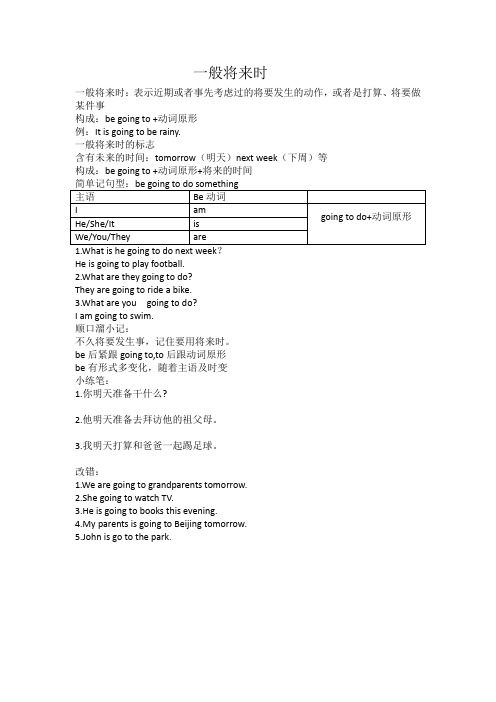
一般将来时
一般将来时:表示近期或者事先考虑过的将要发生的动作,或者是打算、将要做某件事
构成:be going to +动词原形
例:It is going to be rainy.
一般将来时的标志
含有未来的时间:tomorrow(明天)next week(下周)等
构成:be going to +动词原形+将来的时间
He is going to play football.
2.What are they going to do?
They are going to ride a bike.
3.What are you going to do?
I am going to swim.
顺口溜小记:
不久将要发生事,记住要用将来时。
be后紧跟going to,to后跟动词原形
be有形式多变化,随着主语及时变
小练笔:
1.你明天准备干什么?
2.他明天准备去拜访他的祖父母。
3.我明天打算和爸爸一起踢足球。
改错:
1.We are going to grandparents tomorrow.
2.She going to watch TV.
3.He is going to books this evening.
4.My parents is going to Beijing tomorrow.
5.John is go to the park.。
一般将来时的定义、结构、例句、用法
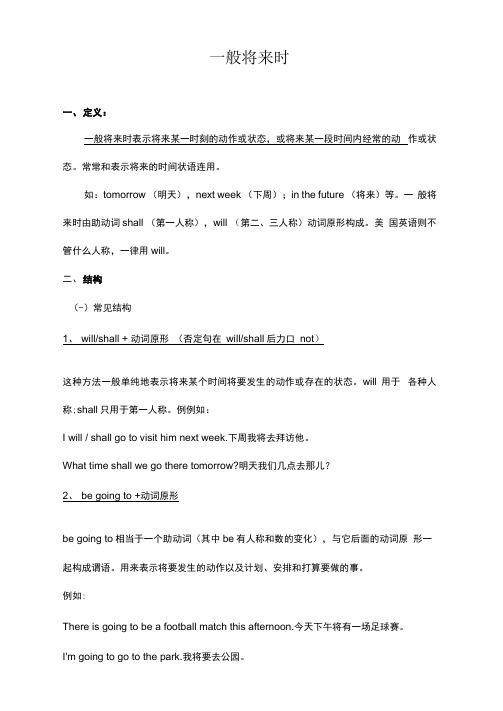
一般将来时一、定义:一般将来时表示将来某一时刻的动作或状态,或将来某一段时间内经常的动作或状态。
常常和表示将来的时间状语连用。
如:tomorrow (明天),next week (下周);in the future (将来)等。
一般将来时由助动词shall (第一人称),will (第二、三人称)动词原形构成。
美国英语则不管什么人称,一律用will。
二、结构(-)常见结构1、will/shall + 动词原形(否定句在will/shall后力口not)这种方法一般单纯地表示将来某个时间将要发生的动作或存在的状态。
will用于各种人称;shall只用于第一人称。
例例如:I will / shall go to visit him next week.下周我将去拜访他。
What time shall we go there tomorrow?明天我们几点去那儿?2、be going to +动词原形be going to相当于一个助动词(其中be有人称和数的变化),与它后面的动词原形一起构成谓语。
用来表示将要发生的动作以及计划、安排和打算要做的事。
例如:There is going to be a football match this afternoon.今天下午将有一场足球赛。
I'm going to go to the park.我将要去公园。
(-)常用结构1、用于"I expect, I'm sure, I think, I wonder 等的宾语从句"中。
Don't worry about the exam. I'm sure you'll pass.不要担心这次考试,我确信你会通过的。
2、用于祈使句和陈述句中。
Work hard and you will succeed.如果你努力,就会成功的。
3、与表示时间或条件的状语从句连用。
英语一般将来时

与一般将来时连用的时间状语
1. We will have a picnic tomorrow. (明天) 明天我们要野餐。 2. He will come back the day after tomorrow. (后天) 后天他将回来。 3. You will see your daughter soon. (很快 不久) 你很快将看到你的女儿。 4. They will get to Beijing in three days. (三天后) 他们三天后将到达北京。 5. What will happen in the future?(在将来) 将来将要发生什么? 6. She will go to Dalian next week. (下周) 下周她将去大连。 7. My dream will come true some day. (将来一天) 将来有一天我的梦想会实现。
;
。
【例句5】 There won’t be blackboards in the classroom in the future. 【归纳5】
There be一般将来时句式变否定句式在will后面 加not,简写为won’t。
跟踪小测2
解题步骤:1.选择正确答案;2.说出你的依据(考查知识点)。 1. There C a football match tomorrow afternoon. A. was B. is going to are C. will be 2. B a lot of books for your classmates next term? A. Are there will B. Will there be C. Will there are 3. --Will there be a computer on your desk? -- C . A. Yes, there is B. No, there aren’t C. No, there Won’t 4. There B any cars on the road in the future. A. will be B. won’t be C. won’t
一般将来时
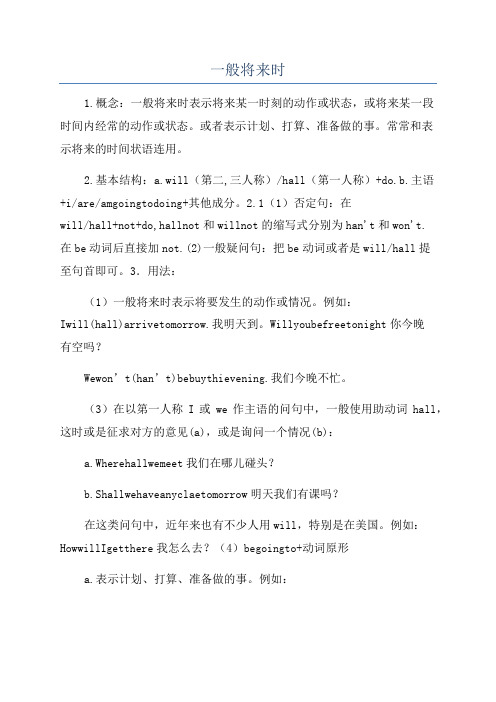
一般将来时1.概念:一般将来时表示将来某一时刻的动作或状态,或将来某一段时间内经常的动作或状态。
或者表示计划、打算、准备做的事。
常常和表示将来的时间状语连用。
2.基本结构:a.will(第二,三人称)/hall(第一人称)+do.b.主语+i/are/amgoingtodoing+其他成分。
2.1(1)否定句:在will/hall+not+do,hallnot和willnot的缩写式分别为han't和won't.在be动词后直接加not.(2)一般疑问句:把be动词或者是will/hall提至句首即可。
3.用法:(1)一般将来时表示将要发生的动作或情况。
例如:Iwill(hall)arrivetomorrow.我明天到。
Willyoubefreetonight你今晚有空吗?Wewon’t(han’t)bebuythievening.我们今晚不忙。
(3)在以第一人称I或we作主语的问句中,一般使用助动词hall,这时或是征求对方的意见(a),或是询问一个情况(b):a.Wherehallwemeet我们在哪儿碰头?b.Shallwehaveanyclaetomorrow明天我们有课吗?在这类问句中,近年来也有不少人用will,特别是在美国。
例如:HowwillIgetthere我怎么去?(4)begoingto+动词原形a.表示计划、打算、准备做的事。
例如:Wearegoingtoputupabuildinghere.我们打算在这里盖一座楼。
Howareyougoingtopendyourholiday假期你准备怎样过?b.表示即将发生或肯定要发生的事。
例如:Ithinkitigoingtonow.我看要下雪了。
(5)用一般现在时表示将来的情况。
在主从复合句中,当主句为一般将来时时,在if,aoona,until,when等引导的状语从句中用一般现在时代替一般将来时。
如:Ifitdoen’trainthiafternoon,we’llhaveaf ootballmatch.如果今天下午不下雨,我们将进行一场足球比赛。
一般将来时知识点
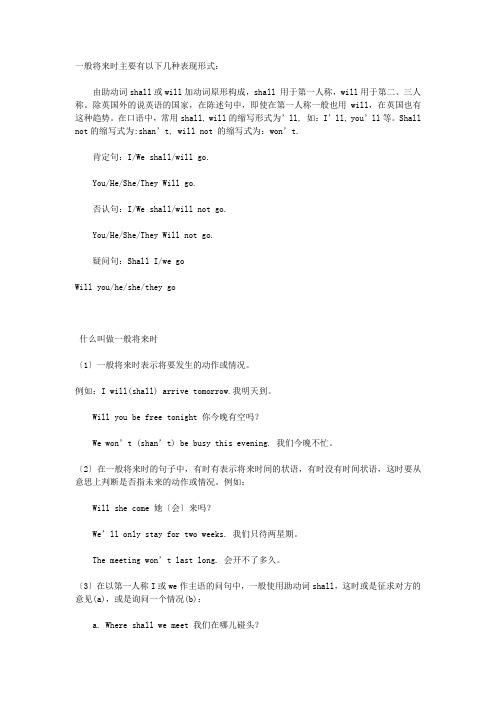
一般将来时主要有以下几种表现形式:由助动词shall或will加动词原形构成,shall 用于第一人称,will用于第二、三人称。
除英国外的说英语的国家,在陈述句中,即使在第一人称一般也用will,在英国也有这种趋势。
在口语中,常用shall, will的缩写形式为’ll, 如:I’ll, you’ll等。
Shall not的缩写式为:shan’t, will not 的缩写式为:won’t.肯定句:I/We shall/will go.You/He/She/They Will go.否认句:I/We shall/will not go.You/He/She/They Will not go.疑问句:Shall I/we goWill you/he/she/they go什么叫做一般将来时〔1〕一般将来时表示将要发生的动作或情况。
例如:I will(shall) arrive tomorrow.我明天到。
Will you be free tonight 你今晚有空吗?We won’t (shan’t) be busy this evening. 我们今晚不忙。
〔2〕在一般将来时的句子中,有时有表示将来时间的状语,有时没有时间状语,这时要从意思上判断是否指未来的动作或情况。
例如:Will she come 她〔会〕来吗?We’ll only stay for two weeks. 我们只待两星期。
The meeting won’t last long. 会开不了多久。
〔3〕在以第一人称I或we作主语的问句中,一般使用助动词shall,这时或是征求对方的意见(a),或是询问一个情况(b):a. Where shall we meet 我们在哪儿碰头?b. Shall we have any classes tomorrow明天我们有课吗?在这类问句中,近年来也有不少人用will,特别是在美国。
例如:How will I get there 我怎么去?〔4〕be going to+动词原形a.表示打算、准备做的事。
一般将来时讲解(附习题+答案)

一般将来时讲解(附习题+答案)一、一般将来时的含义:表示动作发生在将来二、一般将来时的句型:(1) will/shall+动词原形(2) be going to+动词原形三、一般将来时的时间状语:tomorrow(明天)、the day after tomorrow(后天)、next...(下一...): next week(下一周)、next year(明年)、next month(下个月)in+一段时间(...之后): in three days(三天之后)、in the future在未来this evening(今天晚上)四、一般将来时的句型结构:(1) will/shall+动词原形(will not =won’t)(will 各种人称均可用,shall 只能用于第一人称)1)肯定句:主语+will/shall+动词原型...如:I will go to school tomorrow.我明天将会去学校He will go to school tomorrow.他明天将会去学校。
2)否定句:主语+will/shall+not+动词原型...如:I won’t go to school tomorrow.我明天将不会去学校。
He won’t go to school tomorrow.他明天将不会去学校。
3)一般疑问句:Will/Shall +主语+动词原型...如:Will you go to school tomorrow?你明天要去学校吗?Will he go to school tomorrow?他明天要去学校吗?肯定回答:Yes, 主语+will.如:Yes, I will.Yes, he will.否定回答:No,主语+will+not.如:No, I won’t.No, he won’t.4) 特殊疑问句:特殊疑问词+will/shall+主语+动词原型...如:What will you do tomorrow?你明天将会做什么?What will he do tomorrow?他明天将会做什么?(2) be going to+动词原形1)肯定句:主语+be going to +动词原型...如:I am going to buy some books tomorrow.我明天打算去买一些书。
一般将来时的词性
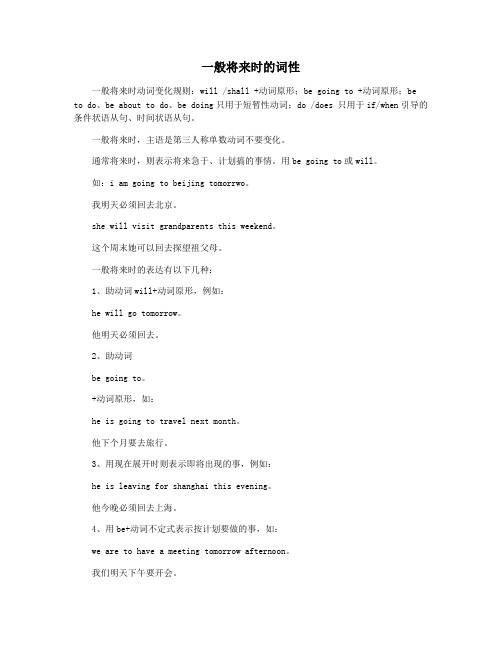
一般将来时的词性
一般将来时动词变化规则:will /shall +动词原形;be going to +动词原形;be to do、be about to do、be doing只用于短暂性动词;do /does 只用于if/when引导的条件状语从句、时间状语从句。
一般将来时,主语是第三人称单数动词不要变化。
通常将来时,则表示将来急于、计划搞的事情。
用be going to或will。
如:i am going to beijing tomorrwo。
我明天必须回去北京。
she will visit grandparents this weekend。
这个周末她可以回去探望祖父母。
一般将来时的表达有以下几种:
1、助动词will+动词原形,例如:
he will go tomorrow。
他明天必须回去。
2、助动词
be going to。
+动词原形,如:
he is going to travel next month。
他下个月要去旅行。
3、用现在展开时则表示即将出现的事,例如:
he is leaving for shanghai this evening。
他今晚必须回去上海。
4、用be+动词不定式表示按计划要做的事,如:
we are to have a meeting tomorrow afternoon。
我们明天下午要开会。
5、用be+about to do则表示急忙出现的某事,例如: he is about to leave the room。
他马上就要返回房间了。
一般将来时定义,结构,标志词,用法,变化规则
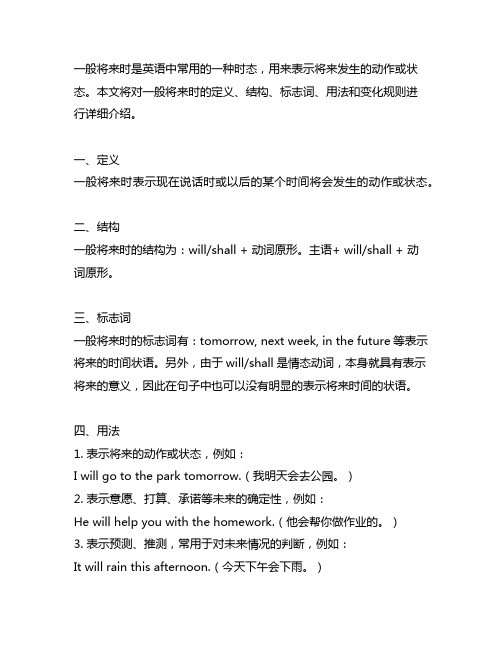
一般将来时是英语中常用的一种时态,用来表示将来发生的动作或状态。
本文将对一般将来时的定义、结构、标志词、用法和变化规则进行详细介绍。
一、定义一般将来时表示现在说话时或以后的某个时间将会发生的动作或状态。
二、结构一般将来时的结构为:will/shall + 动词原形。
主语+ will/shall + 动词原形。
三、标志词一般将来时的标志词有:tomorrow, next week, in the future等表示将来的时间状语。
另外,由于will/shall是情态动词,本身就具有表示将来的意义,因此在句子中也可以没有明显的表示将来时间的状语。
四、用法1. 表示将来的动作或状态,例如:I will go to the park tomorrow.(我明天会去公园。
)2. 表示意愿、打算、承诺等未来的确定性,例如:He will help you with the homework.(他会帮你做作业的。
)3. 表示预测、推测,常用于对未来情况的判断,例如:It will rain this afternoon.(今天下午会下雨。
)五、变化规则1. 肯定句的一般将来时结构为:will/shall + 动词原形。
例如:She wille to see me tomorrow.(她明天会来看我。
)2. 否定句的一般将来时结构为:will/shall + not + 动词原形。
例如:I will not go to the party tonight.(我今晚不会去参加派对。
)3. 疑问句的一般将来时结构为:will/shall + 主语+ 动词原形。
例如:Will youe to the meeting tomorrow?(你明天会来参加会议吗?)以上就是关于一般将来时的定义、结构、标志词、用法和变化规则的详细介绍。
希望对您有所帮助。
一般将来时是英语中最常用的一种时态之一,用于表示将来会发生的动作或状态。
一般将来时
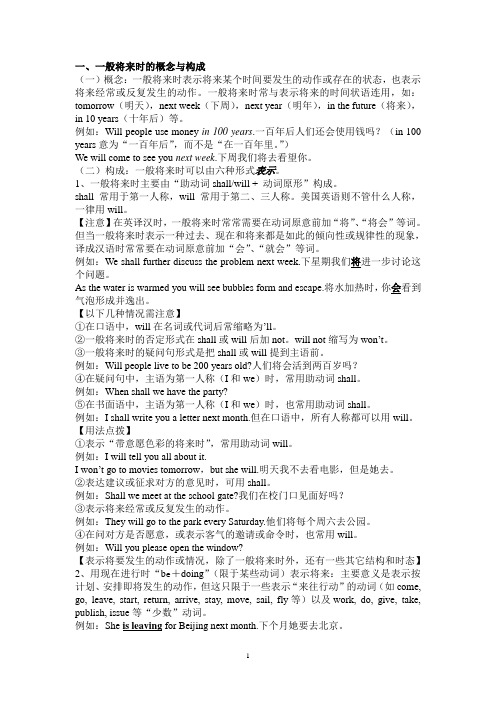
一、一般将来时的概念与构成(一)概念:一般将来时表示将来某个时间要发生的动作或存在的状态,也表示将来经常或反复发生的动作。
一般将来时常与表示将来的时间状语连用,如:tomorrow(明天),next week(下周),next year(明年),in the future(将来),in 10 years(十年后)等。
例如:Will people use money in 100 years.一百年后人们还会使用钱吗?(in 100 years意为“一百年后”,而不是“在一百年里。
”)We will come to see you next week.下周我们将去看望你。
(二)构成:一般将来时可以由六种形式表示。
1、一般将来时主要由“助动词shall/will + 动词原形”构成。
shall 常用于第一人称,will常用于第二、三人称。
美国英语则不管什么人称,一律用will。
【注意】在英译汉时,一般将来时常常需要在动词原意前加“将”、“将会”等词。
但当一般将来时表示一种过去、现在和将来都是如此的倾向性或规律性的现象,译成汉语时常常要在动词原意前加“会”、“就会”等词。
例如:We shall further discuss the problem next week.下星期我们将进一步讨论这个问题。
As the water is warmed you will see bubbles form and escape.将水加热时,你会看到气泡形成并逸出。
【以下几种情况需注意】①在口语中,will在名词或代词后常缩略为’ll。
②一般将来时的否定形式在shall或will后加not。
will not缩写为won’t。
③一般将来时的疑问句形式是把shall或will提到主语前。
例如:Will people live to be 200 years old?人们将会活到两百岁吗?④在疑问句中,主语为第一人称(I和we)时,常用助动词shall。
一般将来时
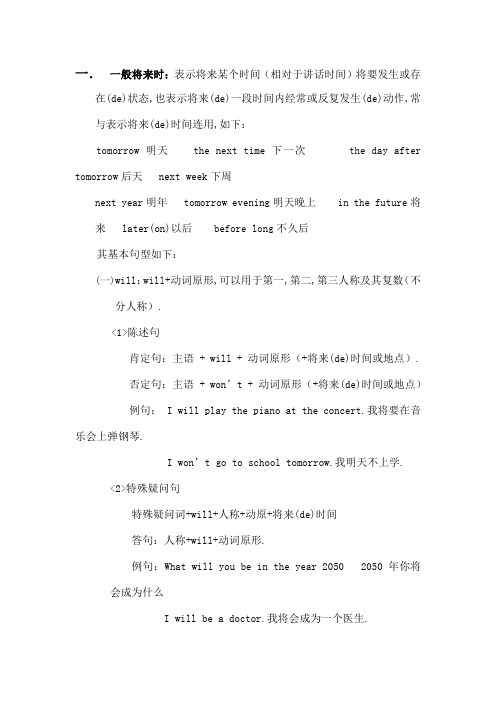
一.一般将来时:表示将来某个时间(相对于讲话时间)将要发生或存在(de)状态,也表示将来(de)一段时间内经常或反复发生(de)动作,常与表示将来(de)时间连用,如下:tomorrow明天 the next time下一次 the day after tomorrow后天 next week下周next year明年 tomorrow evening明天晚上 in the future将来 later(on)以后 before long不久后其基本句型如下:(一)will:will+动词原形,可以用于第一,第二,第三人称及其复数(不分人称).<1>陈述句肯定句:主语 + will + 动词原形(+将来(de)时间或地点).否定句:主语 + won’t + 动词原形(+将来(de)时间或地点)例句: I will play the piano at the concert.我将要在音乐会上弹钢琴.I won’t go to school tomorrow.我明天不上学.<2>特殊疑问句特殊疑问词+will+人称+动原+将来(de)时间答句:人称+will+动词原形.例句:What will you be in the year 2050 2050年你将会成为什么I will be a doctor.我将会成为一个医生.<3>一般疑问句Will+人称+动词原形(+将来(de)时间或地点)答句:Yes,人称+will. No,人称+won’t.例句:Will you visit your grandparents this Saturday 这周六你是否去拜访你(de)爷爷奶奶Yes, I will.(二)shall:shall+动词原形,只能用于第一人称(de)单复数(I, we)<1>陈述句肯定句:I/We shall + 动词原形(+将来(de)时间或地点).我/我们将要…否定句:I/We shall not + 动词原形(+将来(de)时间或地点).我/我们将不会…<2>特殊疑问句:特殊疑问词 + shall + 人称 + 动词原形(+将来(de)时间)答语: I/We shall + 动词原形例如:What shall we do 我们该怎么办Where shall I go 我该去哪呢<3>一般疑问句Shall I / we + 动词原形(+将来(de)时间或地点)答语:Yes, I / we shall. No, I / we shall not.例句:Shall I/ we go to school tomorrow 我/我们明天将要上学吗Yes, we shall. No, we shall not.(三)be going to结构,根据人称及单复数变换系动词be(de)形式(am,is, are).(1)be going to +动词原形,表示将来要做某事或发生某事.(2)be going to + 地点,表示将要去某地(3)be going there/here.将要去那里/这里一、单项选择.1. There __________ a meeting tomorrow afternoon.A. will be going toB. will going to beC. is going to beD. will go to be2. Charlie ________ here next month.A. isnt workingB. doesnt workingC. isnt going to workingD. wont work3. He ______ very busy this week, he ________ free next week.A. will be; isB. is; isC. will be; will beD. is; will be4. There ______ a dolphin show in the zoo tomorrow evening.A. wasB. is going to haveC. will haveD. is going to be5. –________ you ________ free tomorrow– No. I ________ free the day after tomorrow.A. Are; going to; willB. Are; going to be; willC. Are; going to; will beD. Are; going to be; will be6. Mother ________ me a nice present on my next birthday.A. will givesB. will giveC. givesD. give7. – Shall I buy a cup of tea for you–________.A. No, you wont.B. No, you arent.C. No, please dont.D. No, please.8. – Where is the morning paper– I ________ if for you at once.A. getB. am gettingC. to getD. will get9. ________ a concert next SaturdayA. There will beB. Will there beC. There can beD. There are10. If they come, we ________ a meeting.A. haveB. will haveC. hadD. would have11. He ________ her a beautiful hat on her next birthday.A. givesB. gaveC. will givingD. is going to giving12. He ________ to us as soon as he gets there.A. writesB. has writtenC. will writeD. wrote13. He ________ in three days.A. coming backB. came backC. will come backD. is going to coming back14. If it ________ tomorrow, well go roller-skating.A. isnt rainB. wont rainC. doesnt rainD. doesnt fine15. – Will his parents go to see the Beijing opera tomorrow – No, ________ .A. they willnt.B. they wont.C. they arent.D. they dont.16. Who _____ we ______ swimming with tomorrow afternoonA. will; goB. do; goC. will; goingD. shall; go17. We ________ the work this way next time.A. doB. will doC. going to doD. will doing18. Tomorrow he ________ a kite in the open air first, and then ________ boating in the park.A. will fly; will goB. will fly; goesC. is going to fly; will goesD. flies; will go19. The day after tomorrow they ________ a volleyball match.A. will watchingB. watchesC. is watchingD. is going to watch20. There ________ a birthday party this Sunday.A. shall beB. will beC. shall going to beD. will going to be21. They ________ an English evening next Sunday.A. are havingB. are going to haveC. will havingD. is going to have22. ________ you ________ free next SundayA. Will; areB. Will; beC. Do; beD. Are; be23. He ________ there at ten tomorrow morning.A. willB. isC. will beD. be24. ______your brother ______ a magazine from the libraryA. Are; going to borrowB. Is; going to borrowC. Will; borrowsD. Are; going to borrows25. – Shall I come again tomorrow afternoon–________ .A. Yes, pleaseB. Yes, you will.C. No, please.D. No, you wont.26. It ________ the year of the horse next year.A. is going to beB. is going toC. will beD. will is27. ________ open the windowA. Will you pleaseB. Please will youC. You pleaseD. Do you28. – Lets go out to play football, shall we– OK. I ________.A. will comingB. be going to comeC. comeD. am coming29. It ________ us a long time to learn English well.A. takesB. will takeC. spendsD. will spend30. The train ________ at 11.A. going to arriveB. will be arriveC. is going toD. is arriving改句子.5. Nancy is going to go camping.(改否定)Nancy _______ going to go camping.6. I’ll go and join them.(改否定)I _______ go _______ join them.7. I’m going to get up at 6:30 tomorrow.(改一般疑问句)_______ _______ _______ to get up at 6:30 tomorrow8. We will meet at the bus stop at 10:30.(改一般疑问句)_______ _______ meet at the bus stop at 10:30.9. She is going to listen to music after school.(对划线部分提问)_______ _______ she _______ _______ _______ after school10. My father and mother are going to see a play the day after tomorrow.(对划线部分提问)_______ _______ going to see a play the day after tomorrow.用所给词(de)适当形式填空.11. Today is a sunny day. We _______ (have) a picnic this afternoon.12. My brother _______ (go) to Shanghai next week.13. Tom often _______ (go) to school on foot. But today is rain. He _______ (go) to school by bike.14. What do you usually do at weekends I usually _______ (watch) TV and _______ (catch) insects15. It’s Friday today. What _______ she _______ (do) this weekend She _______ (watch) TV and _______ (catch) insects.16. What _______ (do) you do last Sunday I _______ (pick) apples on a farm. 17. Mary _______ (visit) her grandparents tomorrow.18. Liu Tao _______ (fly) kites in the playground yesterday.19. David _______ (give) a puppet show next Monday.20. I _______ (plan) for my study now。
一般将来时
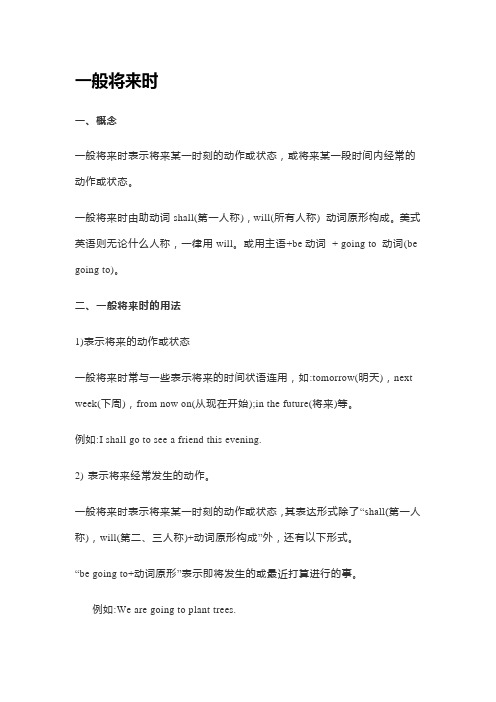
一般将来时一、概念一般将来时表示将来某一时刻的动作或状态,或将来某一段时间内经常的动作或状态。
一般将来时由助动词shall(第一人称),will(所有人称) 动词原形构成。
美式英语则无论什么人称,一律用will。
或用主语+be动词+ going to 动词(be going to)。
二、一般将来时的用法1)表示将来的动作或状态一般将来时常与一些表示将来的时间状语连用,如:tomorrow(明天),next week(下周),from now on(从现在开始);in the future(将来)等。
例如:I shall go to see a friend this evening.2)表示将来经常发生的动作。
一般将来时表示将来某一时刻的动作或状态,其表达形式除了“shall(第一人称),will(第二、三人称)+动词原形构成”外,还有以下形式。
“be going to+动词原形”表示即将发生的或最近打算进行的事。
例如:We are going to plant trees.三、一般将来时的句型①肯定句:主语+ be going to do /will/shall+ 动词原形②否定句:主语+ be not going to do /will not/shall not+ 动词原形③疑问句:Be动词+主语+ going to do /Will/Shall+主语+ 动词原形简略回答:(肯)Yes,主语shall/will (否) No,主语+shan't/won't④特殊疑问句:特殊疑问词+一般疑问句(就主语提问时,以疑问词who开头的疑问词除外)----- Why will you be here on Sunday?(周日你为什么将要在这儿?)-----I will have a meeting on Sunday(我将要在周日举行一个聚会)(对特殊疑问句要进行具体回答)一般疑问句:be或will提到句首,some改any,and改or,第一二人称互换We are going to go on an outing this weekend.-------Are you going to go on an outing this weekend?被动句:will/shall+be+v.ed(及物动词过去分词)The letter will be sent tomorrow.这封信明天将寄出去We shall be punished if we break the rule.如果我们违反规定,我们将受到惩罚。
一般将来时
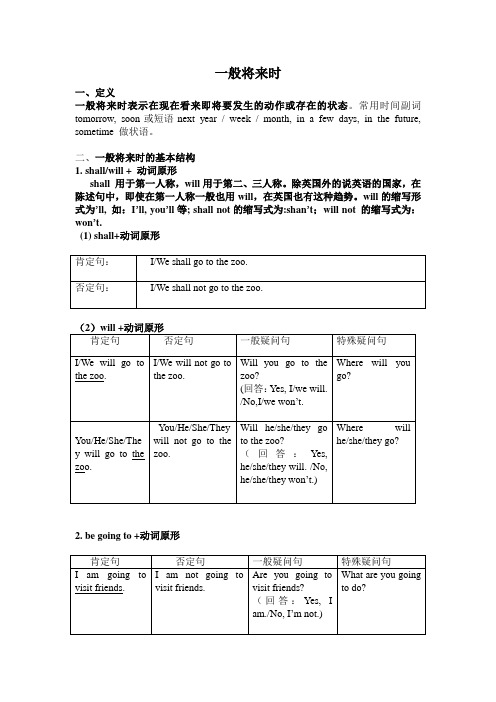
一般将来时一、定义一般将来时表示在现在看来即将要发生的动作或存在的状态。
常用时间副词tomorrow, soon或短语next year / week / month, in a few days, in the future, sometime 做状语。
二、一般将来时的基本结构1.shall/will + 动词原形shall 用于第一人称,will用于第二、三人称。
除英国外的说英语的国家,在陈述句中,即使在第一人称一般也用will,在英国也有这种趋势。
will的缩写形式为’ll, 如:I’ll, you’ll等; shall not的缩写式为:shan’t;will not 的缩写式为:won’t.(1) shall+动词原形肯定句:I/We shall go to the zoo.否定句:I/We shall not go to the zoo.(2)will +动词原形肯定句否定句一般疑问句特殊疑问句I/We will go to the zoo. I/We will not go tothe zoo.Will you go to thezoo?(回答:Yes, I/we will./No,I/we won’t.Where will yougo?You/He/She/The y will go to the zoo.You/He/She/Theywill not go to thezoo.Will he/she/they goto the zoo?(回答:Yes,he/she/they will. /No,he/she/they won’t.)Where willhe/she/they go?2. be going to +动词原形肯定句否定句一般疑问句特殊疑问句I am going to visit friends. I am not going tovisit friends.Are you going tovisit friends?(回答:Yes, Iam./No, I’m not.)What are you goingto do?He/She is going to visit friends. He/She is not goingto visit friends.Is he/she going tovisit friends?(回答:Yes, he/sheis./No,he/she isn’t.)What is he/shegoing to do?We/You/They are going to visit friends. We/You/They are notgoing to visit friends.Are you/they goingto visit friends?(回答:Yes, we/theyare./No,we/theydon’t.)What are you/theygoing to do?三、一般将来时的基本用法1.表示单纯的将来事实,由“will / shall + 动词原形”构成。
- 1、下载文档前请自行甄别文档内容的完整性,平台不提供额外的编辑、内容补充、找答案等附加服务。
- 2、"仅部分预览"的文档,不可在线预览部分如存在完整性等问题,可反馈申请退款(可完整预览的文档不适用该条件!)。
- 3、如文档侵犯您的权益,请联系客服反馈,我们会尽快为您处理(人工客服工作时间:9:00-18:30)。
其他表示将来的结构2
• (3) “be about to+动词原形” 。表示即将要发生的 事: • He is about to leave. 他即将要离开。 • Sit down, everyone. The film is about to start. 大 家坐好,电影马上就要开发始了。 • 注:该结构通常不与具体的时间状语连用 • (4) “be due to+动词原形”。主要表示按计划或时 间表将要发生某事: • He is due to leave very soon. 他很快就要离开。 • His book is due to be published in October. 他的 书计划10月份出版。
其他表示将来的结构3
• (5) 用“现在进行时”(be+现在分词)表示。主要表示按计划 或安排要发生的事: • The students are leaving on Sunday. 学生们星期日出发。 • We’re having a party next week. 我们下星期将开一个晚会。 • 注:该用法有时表示即将发生的动作:I’m leaving. 我走了。 • (6) 用“一般现在时”表示。表示按规定或时间表预计要发生 的事: • The train leaves at 7:25 this evening. 火车今晚7:25分开。 • Tomorrow is Wednesday. 明天是星期三。 • We have a holiday tomorrow. 我们明天放假。
一般将来时的基本用法及构成 基本结构:will / shall + 动词原形 We shall have a lot of classes next week. I think she will clean the room.
其他表示将来的结构1
• (1) “be going to+动词原形”。主要表示打算和预测: • We are not going to stay there long. (表打算) • I’m afraid they’re going to lose the game. 恐怕他们 会赛输。(表预测) • Look, it’s going to rain. (表预见) • (2) “be to+动词原形”。主要表示按计划或安排即将 要发生的动作;有时也表示命令、禁止或可能性: • He is to leave for Beijing tomorrow. 他决定明天去北 京。 • Tell him he’s not to be back late. 告诉他不准迟回。
一般将来时
一般将来时:表示在现在看来即将要发生的动作或存在 的状态。 时间标志:时间副词tomorrow, soon或短语next year / week / month, in a few days, in the future, sometime 做状语。如:
பைடு நூலகம்
What will you do this afternoon. They will have a meeting tomorrow. He is going to study abroad next year.
